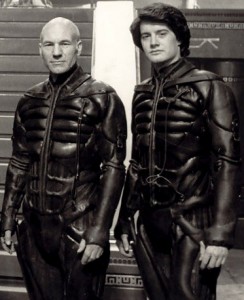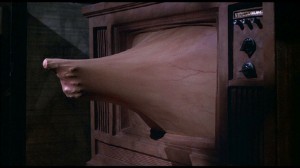 My 14-year-old is obsessed with Frank Herbert’s Dune right now, marveling over the complexity and otherworldly ornamentation that Herbert imbued in his strange hyper-future (or past maybe, who knows). Dune might read as an allegory about Middle Eastern oil or about psychotropic drugs or nothing at all, but regardless of any deeper layers in its palimpsest, it is so surprising to a first reader—especially a young one—that it still has the power to fuel daydreams (I obsessed over building a stillsuit at my son’s age, imagining being able to spend days in the harsh New Mexico summer without the need for water).
My 14-year-old is obsessed with Frank Herbert’s Dune right now, marveling over the complexity and otherworldly ornamentation that Herbert imbued in his strange hyper-future (or past maybe, who knows). Dune might read as an allegory about Middle Eastern oil or about psychotropic drugs or nothing at all, but regardless of any deeper layers in its palimpsest, it is so surprising to a first reader—especially a young one—that it still has the power to fuel daydreams (I obsessed over building a stillsuit at my son’s age, imagining being able to spend days in the harsh New Mexico summer without the need for water).
So it may be surprising that I found myself agreeing with Ian McEwan in The New Republic where he calls into doubt the validity of fiction, though ultimately he rediscovers his love of fiction in Nabakov’s “Caress [of the] divine details” and in John Updike’s controlled descriptions. He comes back again to fiction but not at the expense of wanting nonfiction that brings him new ideas. We are information harvesting machines and the novelty generation rate of nonfiction (there is always the history you do not know much less the cosmology you can’t understand) is just much greater than that of fiction.
But perhaps there is a détente in the middle where fiction and nonfiction commingle. The historical novel is perhaps the best example. The only fear being that the history is too much bent to the requirements of drama and conflict to be at all accurate. Likewise, there might be modern hard science fiction that provides an accurate and deep glimpse into the hermeneutics of real scientific research, and possible scientific futures. Then, at least, there is information beyond the craft of writing embedded within them.… Read the rest






